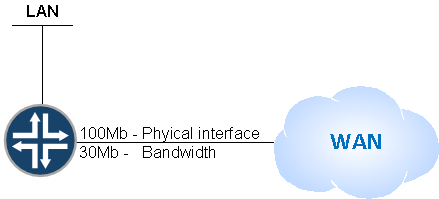An ethernet physical port can only run at certain speeds. i.e. 10/100/1Gb/etc – Often customer will purchase a sublevel of bandwidth on that bearer speed. For example Customer A wants to buy 30Mb of bandwidth. You can’t run the physicla ports at 30Mb, so the ISP will have the interface run at 100Mb and police inbound at 30Mb.
This makes QoS jus a little more complicated. All the ratios we’ve used in the past will ratio themselves at the WAN port’s physical speed. Also the router will not know that if 40Mb of burst comes from the LAN, that the actual bandwidth is only 30Mb.

In this case, you need to first shape all traffic to 30Mb, and then inside that shaped queue give priory bandwidth to voice etc..
IOS
IOS uses the concept of parent/child policy maps. The parent will shape the queue, while the child policy attached will give each queue their respective bandwidths and priority.
policy-map PARENT
class class-default
shape average 30000000
service-policy CHILD
!
policy-map CHILD
class EF
priority percent 10
police cir percent 10 conform-action transmit exceed-action drop
class class-default
bandwidth remaining percent 100
!
interface FastEthernet0/0
ip address 10.0.0.1 255.255.255.0
service-policy output PARENT
In this policy the parent policy creates a queue with a bandwidth limit of 30Mb. Inside that policy rests another that gives EF packets 10 percent of priority bandwidth of that initial 30Mb queue. I’m also policing that queue as I don’t want the priority queue to starve other traffic. All other traffic gets 90-100% of the bandwidth, depending on how much priority traffic is in the queue at any one time.
Junos
As with most QoS topics, the following configuration is quite hardware specific. I’ve done the following on an SRX210H. Your configuration might change when doing the same sort of thing on a M/MX/DC SRX/etc so YMMV.
Create the schedulers:
darreno@JR2> show configuration class-of-service schedulers
EF10 {
transmit-rate {
percent 10;
exact;
}
}
BE_REST {
transmit-rate {
remainder {
100;
}
}
}
Put the above schedulers into a schedule-map:
darreno@JR2> show configuration class-of-service scheduler-maps
SCHEDULE {
forwarding-class expedited-forwarding scheduler EF10;
forwarding-class best-effort scheduler BE_REST;
}
Finally apply that map to the interface under class-of-service and configure the interface shape rate:
darreno@JR2> show configuration class-of-service interfaces ge-0/0/1
unit 2001 {
scheduler-map SCHEDULE;
shaping-rate 30m;
}
In order for the above to work I need to configure per-unit-scheduler on the physical interface:
darreno@JR2> show configuration interfaces ge-0/0/1
per-unit-scheduler;
Verification
Simple again in IOS:
R1#sh policy-map int fa0/0
FastEthernet0/0
Service-policy output: PARENT
Class-map: class-default (match-any)
106 packets, 6360 bytes
5 minute offered rate 0000 bps, drop rate 0000 bps
Match: any
Queueing
queue limit 64 packets
(queue depth/total drops/no-buffer drops) 0/0/0
(pkts output/bytes output) 106/6360
shape (average) cir 30000000, bc 120000, be 120000
target shape rate 30000000
Service-policy : CHILD
queue stats for all priority classes:
Queueing
queue limit 64 packets
(queue depth/total drops/no-buffer drops) 0/0/0
(pkts output/bytes output) 0/0
Class-map: EF (match-all)
0 packets, 0 bytes
5 minute offered rate 0000 bps, drop rate 0000 bps
Match: dscp ef (46)
Priority: 10% (3000 kbps), burst bytes 75000, b/w exceed drops: 0
police:
cir 10 %
cir 3000000 bps, bc 93750 bytes
conformed 0 packets, 0 bytes; actions:
transmit
exceeded 0 packets, 0 bytes; actions:
drop
conformed 0000 bps, exceeded 0000 bps
Class-map: class-default (match-any)
106 packets, 6360 bytes
5 minute offered rate 0000 bps, drop rate 0000 bps
Match: any
Queueing
queue limit 64 packets
(queue depth/total drops/no-buffer drops) 0/0/0
(pkts output/bytes output) 106/6360
bandwidth remaining 100%
We can see the entire queue is 30Mb. Inside that queue EF traffic has priority bandwidth of 3000kbps (10% of 30Mb) – All other traffic has anything left up to 30Mb
On Junos its a bit cryptic again:
darreno@JR2> show class-of-service interface ge-0/0/1
Physical interface: ge-0/0/1, Index: 135
Queues supported: 8, Queues in use: 4
Scheduler map: , Index: 2
Congestion-notification: Disabled
Logical interface: ge-0/0/1.2001, Index: 71
Shaping rate: 30000000
Object Name Type Index
Scheduler-map SCHEDULE Output 2878
I wanted to do a more in-depth post on H-QoS but this SRX doesn’t support it. I don’t currently have an MX in the lab (only in the field) so hopefully soon…